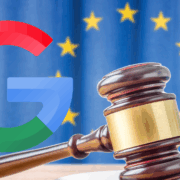Google faces $13 billion in EU civil claims after Shopping antitrust fine

Google is facing a legal reckoning across Europe, with at least €12 billion ($12.9B) in damages sought by price comparison sites who say the tech giant abused its dominance in search to siphon traffic and revenue.
The civil suits stem from the EU’s landmark 2017 decision to fine Google €2.4B for antitrust violations related to its shopping service. With that ruling upheld, plaintiffs now only need to prove financial harm – not the legal wrongdoing itself – opening the door to massive payouts.
Driving the news. A Bloomberg review identified 12 active civil suits in seven EU countries. Nine of the cases have disclosed claims totaling more than €12B. The lawsuits come from a wide mix of players, from well-known brands like Kelkoo and Pricerunner, to shuttered firms like PreisRoboter.
The scoreboard:
| Plaintiff | Country | Claimed Damages |
|---|---|---|
| Trovaprezzi | Italy | €2.97B |
| Pricerunner | Sweden | €2.1B |
| Kelkoo | UK | €1.4B |
| PreisRoboter & others | Netherlands | €900M |
| Ceneo | Poland | €550M |
| Group of six firms | Various | €450M |
| Stylight | Germany | €300M |
| Unknown plaintiff | Germany | €290M |
Why we care. These lawsuits could reshape how Google prioritizes content in search results, particularly for shopping and comparison queries. If courts force changes to Google’s ranking or ad display practices, it could impact ad visibility, CPCs, and the competitive landscape. A shift toward fairer treatment of rival platforms may also create new advertising opportunities outside Google’s ecosystem.
Between the lines. Some plaintiffs are upping their claims and tapping litigation funders, arguing Google’s practices haven’t changed much and that the company continues to tilt the playing field in its own favor.
- “The internet can’t and mustn’t be dominated by monopolies,” said Idealo’s co-founder Albrecht von Sonntag, whose firm recently raised its claim to €3.3B.
Google’s take. The company denies the allegations and says its current product setup is fair, citing more than 1,550 comparison sites using its shopping ad format today, up from just seven in 2017.
- “These lawsuits are brought by companies looking for a payout instead of investing in their own products,” a Google spokesperson said.
What’s next. Major hearings are set in the UK (June), Amsterdam (September), and Berlin (November).
More lawsuits are expected, including a fresh €900M claim filed in April in the Netherlands.
Reality check. Despite the EU ruling, the plaintiffs still must prove Google caused their losses. This is a legally tricky and data-heavy task.
- “You have to factor out other causes,” said Christian Kersting, a law professor in Düsseldorf. “It’s extremely complicated.”
Bottom line. Google’s courtroom battles in Europe could reshape how dominant platforms are held accountable – and open the floodgates for even more private enforcement of antitrust law.


